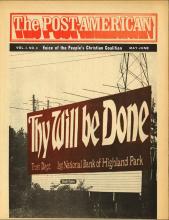There is much reason for celebration as we witness a growing body of Christian conscience across our land. It is exciting to see more and more people discovering the implications of radical discipleship. But as we grow together, there are dangers and temptations to be avoided. We at the Post-American are more than ever of a mind to resist suggestions and efforts that would organize and institutionalize the movemental spirit. The model we have chosen to follow is that of voluntary horizontal relationships between communities and people rather than the model of top-down decision-making structures. The Post-American seeks to serve as a forum for the growing thought and experience of this movemental church spirit. We seek to facilitate communication and relationships, not to create institutions.
Read the Full Article

